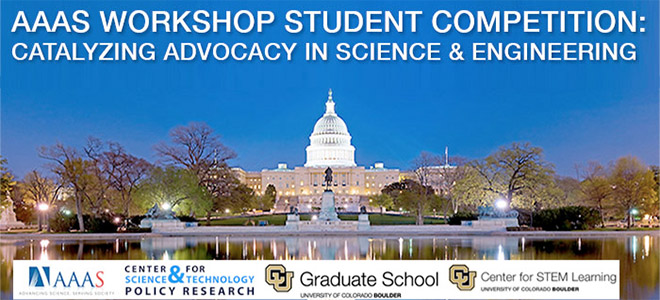The Graduate Certificate Program in Science and Technology Policy of the CIRES Center for Science and Technology Policy Research organized a competition to select two CU students to attend the AAAS “Catalyzing Advocacy in Science and Engineering” workshop in Washington, D.C. April 17-20. At the workshop students will learn about Congress, the federal budget process, and effective science communication, and will have an opportunity to meet with their Members of Congress or congressional staff. The competition is supported by the University of Colorado Graduate School and Center for STEM Learning.
Through a highly competitive selection process Angela Boag (Environmental Studies) and Sarah Welsh-Huggins (Civil, Architectural, and Environmental Engineering) were chosen as this year’s winners to attend the workshop. Their biographies are listed below. Congratulations Angela and Sarah!
Angela Boag
Angela E. Boag is a Ph.D. student at the University of Colorado Boulder investigating the relationships between climate change, forest management and land ownership. She has a Master’s in Forestry from the University of British Columbia and worked for environmental advocacy organizations before returning to graduate school. Now a member of the Communities and Forests in Oregon (CAFOR) research project led by Dr. Joel Hartter, Angela is studying how changing climate and wildfire regimes impact forest resilience, as well as how private forest owners adapt to these changing conditions. She is passionate about linking social and biophysical research to solve complex problems, and advocates for policies that advance environmental sustainability.
Sarah Welsh-Huggins
Originally from Columbus, OH, Sarah is a third-year Ph.D. candidate in the Civil Systems program within the Dept. of Civil, Environmental and Architectural Engineering. Her doctoral research assesses the economic and environmental life-cycle tradeoffs that arise from designing buildings to be both sustainable and hazard-resilient. At CU Boulder, Sarah has also completed a graduate certificate in Engineering for Developing Communities (EDC). Her EDC fieldwork in northeast India in 2014 led her to pursue a M.S. in Structural Engineering, consecutive to her Ph.D. studies, to investigate the seismic risk of hillside buildings in the Indian state of Mizoram. She is the current Co-President of CU Boulder’s student chapter of the national Earthquake Engineering Research Institute, which supports multi-disciplinary research and practice to reduce global earthquake risk. In 2012, Sarah earned a dual B.S./B.A. in Civil Engineering and International Studies from Lafayette College. Post-graduate school, her professional goal is to lead the creation of new approaches for holistic community and urban planning by improving communication channels between citizens, scientists, engineers, and policymakers. She seeks to promote sustainable community development through interdisciplinary solutions that protect natural resources, mitigate natural hazard risk, and ensure a safe and equitable future for generations to come.


